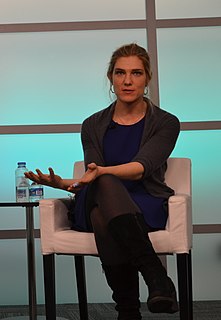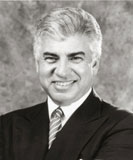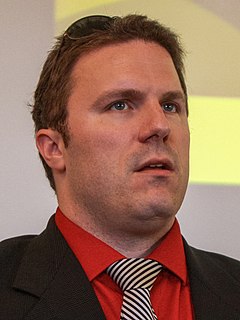Top 38 Civics Quotes & Sayings
Explore popular Civics quotes.
Last updated on April 14, 2025.
To care for the quarrels of the past, to identify oneself passionately with a cause that became, politically speaking, a losing cause with the birth of the modern world, is to experience a kind of straining against reality, a rebellious nonconformity that, again, is rare in America, where children are instructed in the virtues of the system they live under, as though history had achieved a happy ending in American civics.
A majority of students who come into community colleges are still stuck at high school level or remedial math. And when they take it in college, they still don't pass it. So the Carnegie Foundation got together and created two accelerated courses that focus on real-world applications of numbers like for health, for civics, for personal finance - concepts that you and I use every single day.
In an age when many of our citizens casually reveal information about themselves in social media wildly beyond anything imaginable only a decade ago, it would seem to be a useful exercise in civics to re-educate the public about the value and purpose of protecting against unwarranted government intrusion.
Can I add a class? Do you have a problem with letting me audit 8th grade American Civics? Can you get the AP English reading list for me right now? What is this carton of milk? Will you tell me how many calories are in five and half Gummi Bears? Why are there birds in the air right now? Why is the sky so blue? Can I get the home phone number of the school district supervisor? You know I was in Basic Instinct, right?
Third, and finally, the educated citizen has an obligation to uphold the law. This is the obligation of every citizen in a free and peaceful society--but the educated citizen has a special responsibility by the virtue of his greater understanding. For whether he has ever studied history or current events, ethics or civics, the rules of a profession or the tools of a trade, he knows that only a respect for the law makes it possible for free men to dwell together in peace and progress.
I'm skeptical about even educating voters as a chance for being successful. You know, when we look at what people retain from high school a year after they've graduated, they've forgotten most everything about history and civics and everything, and I think the main worry here is that because your individual vote counts for so little, you just don't have a strong incentive to invest in the knowledge, to retain the knowledge, to process information in a rational way.
I was taught in the sixth grade that we had a standing army of just over a hundred thousand men and that the generals had nothing to say about what was done in Washington. I was taught to be proud of that and to pity Europe for having more than a million men under arms and spending all their money on airplanes and tanks. I simply never unlearned junior civics. I still believe in it. I got a very good grade.
I've noticed a fascinating phenomenon in my twenty-five years of teaching - that schools and schooling are increasingly irrelevant to the great enterprises of the planet. No one believes anymore that scientists are trained in science classes or politicians in civics classes or poets in English classes. The truth is that schools don't really teach anything except how to obey orders.
We still are America though. We're still a country that is a country of social mobility. We're still a country of immigrants. We're still a country with common ancestors. And reviving the civics of America and the idea that we're going to be united, at least not right now, but in some common future, and talking in that hopeful way that Martin Luther King did, that Abraham Lincoln did, seems to me that's the way.
The Trump campaign management team had to be fired a month or so ago because of those shadowy connections with pro-Putin forces. Governor Pence made the odd claim, he said inarguably Vladimir Putin is a better leader than President Obama. Vladimir Putin has run his economy into the ground. He persecutes LGBT folks and journalists. If you don't know the difference between dictatorship and leadership, then you got to go back to a fifth-grade civics class.
This is a very proud moment for journalism. I think The New York Times and The Washington Post are genuine champions in this moment. The role that they are playing in democracy is the role that you hear about journalism playing in civics classes. Other people are doing great work, but the Times and the Post have really been leaders. The public is watching, and they are hungry. They know something is wrong, there's a lot of anxiety out there. There's a real sense that the mission of journalism is very clear.
Men who find themselves late are never sure. They are all the things the civics books tell us the good citizen should be: partisans but never zealots, respectors of the facts which attend each situation but never benders of those facts, uncomfortable in positions of leadership but rarely unable to turn down a responsibility once it has been offered . . . or thrust upon them. They make the best leaders in a democracy because they are unlikely to fall in love with power.
































